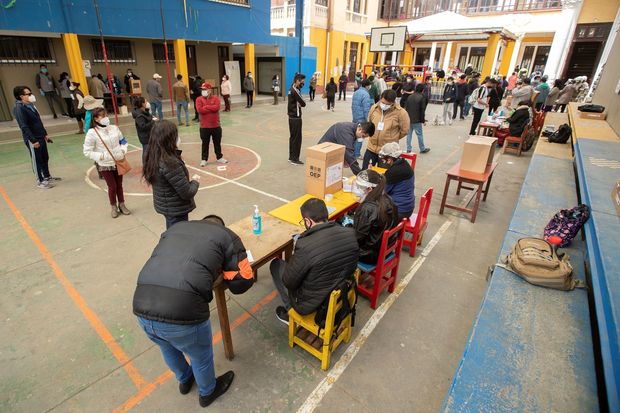
On Sunday, voters lined up to cast their ballots, many of them wearing masks as protection against the coronavirus.
Photo: joedson alves/Shutterstock
A former Bolivian president, Carlos Mesa, on Monday conceded that Luis Arce, the handpicked candidate of former President Evo Morales, had won Sunday’s presidential election, which tested democracy in the resource-rich, landlocked country.
Mr. Mesa said that quick counts carried out by polling firms—a highly probable counting of voting samples—showed his main opponent, Mr. Arce, a former economy minister, had won the race. The victory opens the path to Mr. Morales’s return to Bolivia after last year’s disputed elections forced his resignation.
“The results from the quick count are overwhelming and very clear,” said Mr. Mesa from La Paz, the Bolivian capital.
“The difference between the first candidate and us, Citizens Community, is ample,” he added, referring to his political party. “It’s a result that we accept and it’s a result that we believe, because of the difference between the first and second (finishers), will not be modified when we know the final results.”
The official results from the election weren’t tabulated when interim President Jeanine Áñez said shortly after midnight Monday that Mr. Arce, candidate of the Movement Toward Socialism party, had won the vote.
“I congratulate the winners and I ask that they govern thinking of Bolivia and of democracy,” she said.
A conservative and an opponent of Mr. Morales and his movement, Ms. Áñez hasn’t elaborated on her surprising announcement. And as of Monday, the final results were still not known.
Ms. Áñez’s comments came shortly after the pollster Ciesmori put out the results of its quick count of Sunday’s election, showing Mr. Arce, a 57-year-old former economy minister under Mr. Morales, had taken 52.4% of the vote. The runner-up in Ciesmori’s quick count of a sampling of ballots in the six-candidate election was Mr. Mesa, a 67-year-old historian who had served as president for 18 months between 2003 and 2005.
Mr. Morales, who had been driven from power last November after he claimed victory in an election that observers said was marred by irregularities, celebrated from his exile in Argentina.
“Brothers and sisters, the will of the people has been imposed,” he said via Twitter. “This has been an overwhelming victory.”
At his campaign headquarters in La Paz, Mr. Arce said, “We have recuperated democracy and, more than anything, the Bolivians have recovered hope.”

Luis Arce is former President Morales’s longtime economic czar in the Movement Toward Socialism Party.
Photo: ueslei marcelino/Reuters
The victory amounts to a surprising, outright win that the polls hadn’t predicted for Mr. Morales’s MAS, as the Movement Toward Socialism party is best known.
An Ipsos poll ahead of the vote showed Mr. Arce leading with 34% versus 28% for Mr. Mesa. Another poll by the Latin America Strategic Center for Geopolitics had Mr. Arce winning the presidency in the first round, 44.4% to 34% for Mr. Mesa. To avoid a second round of voting in Bolivia, a first-place finisher needs to collect at least 40% of the vote and hold a 10-point margin over the runner-up.
Sunday’s vote was being watched closely across Latin America, where it was seen as one of Bolivia’s most important since its return to democracy in 1982. The tumult that led to Mr. Morales’s resignation last November sharply divided Bolivia, a landlocked country of 11 million, and led to Ms. Áñez’s caretaker government, which has been criticized as corrupt and botching its response to the Covid-19 pandemic. Ms. Áñez’s spokesperson didn’t respond to a request for comment.
This election was seen as a replay of last October’s vote, which was marked by turmoil after Bolivians rose up against Mr. Morales, who had already ruled 14 years and was trying to win a fourth term.
By then, Mr. Morales, the country’s first indigenous president, had grown increasingly authoritarian, with the ruling MAS dominating all branches of government and the electoral tribunal. Although voters had rejected a 2016 referendum to change the constitution and allow him to run for a fourth consecutive term, a constitutional court packed with Mr. Morales’s allies later allowed him to participate.
After the vote, observers from the Organization of American States said that an audit turned up “clear manipulation” of the voting system. That led to violent protests in which more than 30 people died. After Mr. Morales lost the support of police and the armed forces, he opted to flee into exile. He has since called his departure a coup and vowed that the MAS would return to power.
On Sunday, Bolivia was peaceful as troops and police patrolled the streets. From the country’s lowland jungles to its cold highlands, voters lined up to cast their ballots, many of them wearing masks as protection against the coronavirus, which has killed nearly 8,500 people and given Bolivia one of the world’s highest per capita death rates from Covid-19.
Mr. Morales’s supporters remained loyal to their man and his movement, saying that the MAS would guide Bolivia out of the economic crisis it has been facing since being hit by the pandemic. The International Monetary Fund estimated Bolivia’s economy would contract by 8% this year.
“We believe that the Movement Toward Socialism offers another opportunity for this country,” said Ronald Cuellar, 32, a vendor who voted for Mr. Arce.
Katerin Rocha, 27, a petroleum engineer, also voted for the MAS, saying she believed “in the word of Luis Arce.”
“What I expect from this new government is that they comply with their promises and that they provide opportunities to the young, more than anything else,” she said.

Carlos Mesa, a former president, voting in La Paz on Sunday.
Photo: jorge bernal/Agence France-Presse/Getty Images
Write to Juan Forero at Juan.Forero@wsj.com
Copyright ©2020 Dow Jones & Company, Inc. All Rights Reserved. 87990cbe856818d5eddac44c7b1cdeb8


